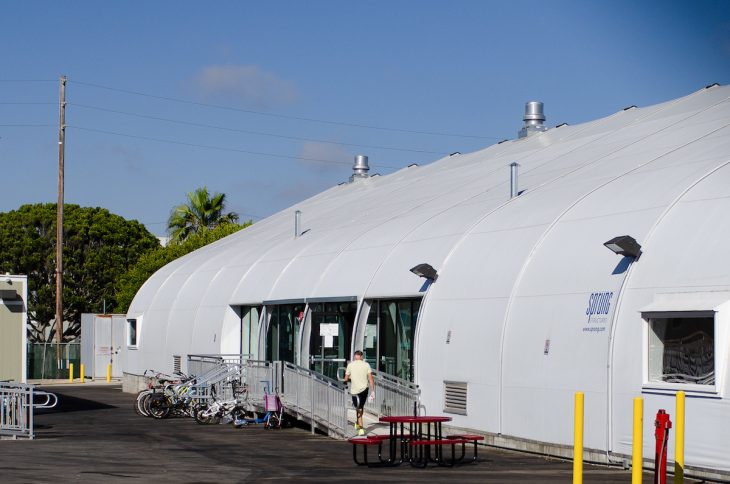By Mark Ryavec
As everyone in North Venice knows, the Venice Bridge Housing facility should never have been placed on the old METRO bus lot on Main Street.
Despite an allegation to the contrary in a recent opinion article on Westside Current, this is the only Bridge Housing (BH) in the City of Los Angeles that is surrounded on all four sides by residences.
While newly-elected Councilmember Traci Park quickly moved to honor the city’s past, unfulfilled promises to prohibit camping anywhere in proximity to the facility, its mere existence continues to be problematic for our community. Neighbors note Venice BH acts as a magnet for homeless folks from all over who show up thinking they can just check in, which is not the case. So, they set up camp on Main Street or filter down to the Boardwalk and attempt to camp there.
My friends living nearby tell of continuing late night noise, open drug use and sales, auto and property break-ins, public urination and defecation, and acts of vandalism, harassment and intimidation. While these crimes have lessened with Bass and Parks’ removal of the encampments around Google and Gold’s Gym, they have not ceased entirely.
Residents close to the site say it is like living next to a stadium, with the night-time glare from the bright lights that ring the site flooding into their homes, requiring black out curtains to sleep.
The purpose of the sixteen Bridge Housing sites around the city was to literally provide a “bridge” from the 2016 passage of Proposition HHH and its $1.2 billion ($1.9 billion when the interest is included) and a future date when the projected 10,000 units would be completed. (In the end, due to increases in construction costs and other factors, only 8,600 HHH units will be built.) Construction was anticipated to take three years, hence Mayor Garcetti and Councilman Bonin promised, in person at a hearing at Westminster Elementary School and in print, that all the Bridge Housing facilities would sunset after three years.
Since Venice is in the Coastal Zone and the jurisdiction of the California Coastal Commission, the city was required to comply with the Coastal Act, which requires a permit (or waiver) for any development. Certainly housing for 150 people and several ancillary buildings is “development” by anyone’s definition. The city filed an application asking for a three-year waiver for the “temporary facility.” In its approval of the waiver, the Coastal Commission specifically required that if the city wished to extend the shelter use of the site that it would have to apply for a formal Coastal Development Permit (CDP) and that no further waiver would be approved.
Our organization, the Venice Stakeholders Association, reminded Councilman Bonin of that requirement in a letter last summer. Nonetheless, Bonin ignored the Commission’s demand for a CDP and had the city council approve a one-year extension, back dating the start date to July 1, 2022; the current extension expires on June 30, 2023.
Our lawsuit is predicated on three concerns:
- Garcetti and Bonin blatantly ruptured trust between the city and Venice residents by not enforcing the prohibition of camping around the facility and breaking their promise that it would be closed after three years of operation (which by our accounting was last month). That trust needs to be rebuilt in general, and specifically by honoring the promise to close the site.
- The failure to abide by the Commission’s demand for a full CDP (as opposed to a waiver) sets a dangerous precedent suggesting other conditions imposed by the Commission on other developers can simply be flaunted with no consequences. It also denies residents of the right in the CDP process to demand mitigation measures, such as added parking and controls on light and noise coming off the site, including installation of a sound wall.
- If the CDP requirement is not enforced, by our lawsuit to invalidate the city council’s November 9, 2022 approval of the extension if necessary, then this burden in our midst can continue ad infinitum despite its original mission as just a bridge to HHH units. Those units are finally opening to homeless tenants at a rate of 200 to 300 per month.
A couple of writers on this subject have theorized that if the lease is invalidated and Bridge Housing is forced to close, that the land would be used for some type of homeless shelter anyway under Mayor Bass’ emergency order. They miss the point that any development on the site would require adherence to the Coastal Act, which as a State law is not nullified by the city’s emergency order.
Finally, it is important to remember that Councilwoman Traci Park publicly promised to honor Bonin and Garcetti’s earlier promise to close the facility after three years of operation. I know because I posed the question to her and the other candidates and then published the results. If my memory serves me, six out of the eight candidates pledged to close it after three years.
Ms. Park, whom I heartily supported, runs the risk of looking like Mr. Bonin if she does not honor her word.
Mark Ryavec is president of Venice Stakeholders Association. He was the lobbyist for No Oil, Inc., a founding director of American Oceans Campaign (now Oceana), and once served as AOC’s State Legislative Director.


























